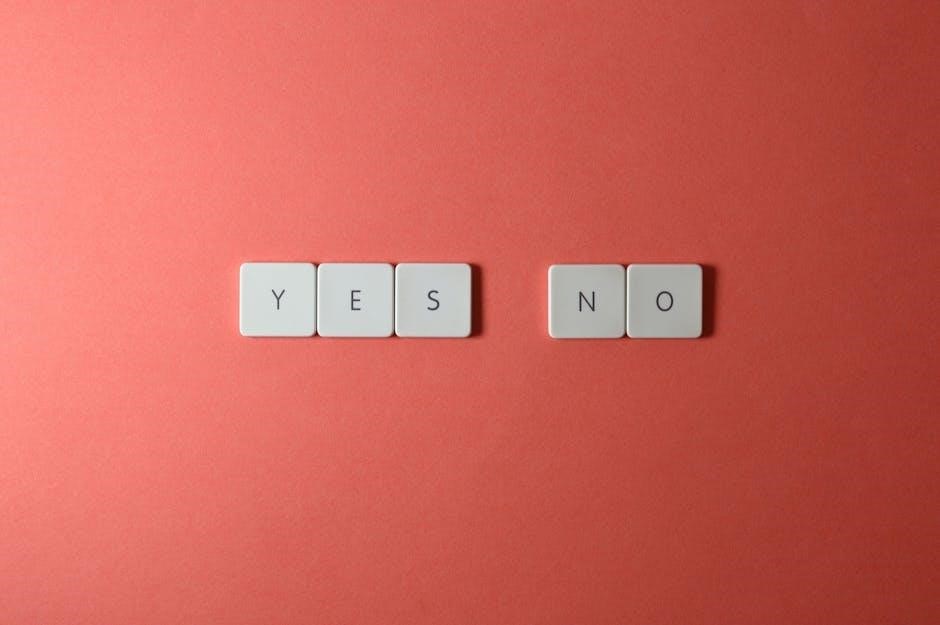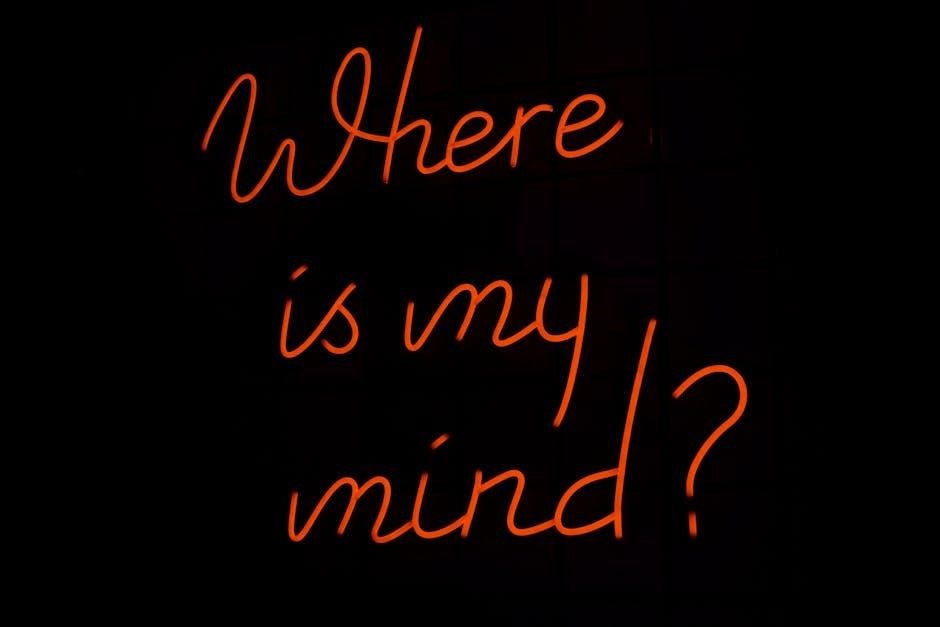WH questions are essential tools in English, using words like who, what, when, where, why, how, and which to gather information․ They help seek details about people, actions, time, places, reasons, and choices, making conversations clearer and more engaging․
What Are WH Questions?
WH questions are inquiries that begin with specific question words starting with “WH,” such as who, what, when, where, why, how, and which․ These questions are designed to gather detailed information about a topic, rather than seeking a simple “yes” or “no” answer․ They are essential for clarifying facts, understanding reasons, or obtaining specific details in both spoken and written English․ For example, who focuses on identifying people, while why explores reasons behind actions․ WH questions are a fundamental part of effective communication, enabling deeper conversations and clearer exchanges of information․ Mastering these questions enhances one’s ability to engage meaningfully in discussions and understand others’ perspectives more thoroughly․
Importance of WH Questions in English
WH questions are crucial for clear communication, enabling speakers to seek detailed information․ They help clarify thoughts, prevent misunderstandings, and deepen conversations․ In learning English, mastering WH questions enhances both spoken and written skills, making interactions more precise․ These questions are essential for problem-solving and critical thinking, as they encourage the exchange of specific details․ Understanding how to use them effectively improves listening and speaking abilities, aiding in professional and academic settings․ WH questions also foster engagement in discussions, making dialogue more meaningful and informative․ By using these questions, learners can express curiosity and gather the information needed to fully understand a topic or situation․
- They promote effective communication․
- They help gather specific details․
- They enhance clarity in conversations․
- They are vital for learning and problem-solving․

Types of WH Questions
WH questions include who, what, when, where, why, how, and which, each serving unique purposes like identifying people, actions, time, places, reasons, manner, or choices․
Who ⎯ Asking About People
The who question is used to ask for information about people involved in a situation․ It helps identify individuals, their roles, or their relationships․ For example, Who is coming to the party? or Who wrote the book? These questions seek specific details about the person involved․ The structure often begins with who, followed by a verb and additional context․ This type of question is essential for clarifying identities or roles in a conversation․ It can also be used to confirm details, such as in Who is the manager of the team? The answer provides the name or description of the person, making it a fundamental tool for gathering personal information in both formal and informal settings․
What ⎻ Asking About Things or Actions
The question word what is used to ask about specific things, actions, or ideas․ It helps gather information about objects, events, or activities․ For example, What is your favorite hobby? asks about a specific activity, while What time is the meeting? seeks information about a specific event․ What can also inquire about opinions or preferences, such as What do you think about the movie?․ It is essential to use what when the answer requires details about a particular thing or action, making it a versatile tool for clear communication in English․

When ⎯ Asking About Time
The when question is used to ask about specific times or periods․ It helps gather information related to schedules, events, or actions occurring at certain moments․ For example, When did you arrive? or What time does the meeting start? This type of question is essential for clarifying timelines and coordinating plans․ It often begins with the word when and requires a time-related response․ In English, when questions are structured with an auxiliary verb, such as did or will, followed by the main verb․ They are commonly used in both formal and informal conversations to seek precise temporal details, making communication clearer and more effective․
- Example 1: When is the deadline for the project?
- Example 2: What time will the concert begin?
Mastering when questions improves your ability to discuss schedules and events effectively in English․
Where ⎻ Asking About Place
WH questions using where are employed to inquire about locations or places․ For instance, “Where is the library?” seeks specific spatial information․ This type of question is crucial for obtaining directional details or clarifying settings in conversations․ In sentences, where often begins the inquiry, as in, “Where did you go last night?” It helps establish context and provides clarity about physical or metaphorical locations․ Mastering where questions enhances communication by allowing precise inquiries about places, making discussions more informative and engaging․ Examples like “Where is the meeting room?” or “Where do you live?” demonstrate its practical application in everyday interactions․
Why ⎯ Asking About Reasons
The why question is used to ask for reasons or explanations behind something․ It helps clarify the purpose or cause of an action, event, or situation․ For example, Why did you choose this book? or Why is the sky blue? These questions encourage detailed responses, providing insights into motivations or underlying factors․
In conversations, why questions promote deeper understanding and can lead to meaningful discussions․ They often begin with why followed by a verb, such as Why are you studying? or Why did she leave early? The structure typically includes a subject and a verb, making it clear and direct․ Using proper intonation is key to conveying genuine curiosity or inquiry․

Learning to use why questions effectively enhances communication skills, allowing speakers to explore reasons and gain clarity in various contexts․ Practice with examples helps build confidence in forming and answering these questions accurately․
How ⎻ Asking About Manner or Condition
The word how is used to ask about the manner in which something is done or the condition of something․ For example, How do you swim? asks about the method, while How did you feel? inquires about a condition․ This question type helps clarify actions, emotions, or states․ In conversations, how questions are essential for understanding details, such as How did you prepare for the exam? or How can I improve my speaking skills?․ They encourage detailed responses, making discussions more informative and engaging․ Mastering how questions enhances communication by seeking specific explanations or descriptions․ Examples like How does this work? or How was your experience? demonstrate their versatility in seeking clarity and depth in various contexts;
Which ⎻ Asking About Choices
Which is used to ask about choices between two or more options․ For example, “Which color do you prefer, blue or green?” This question helps the speaker understand the listener’s preference by narrowing down the options․ It is often used to seek clarification or guidance when multiple alternatives are available․ For instance, “Which movie should we watch tonight?” demonstrates how which is employed to make a decision between options․ This type of question is particularly useful in everyday conversations, as it allows for efficient decision-making and clear communication of preferences․ Mastering the use of which enhances conversational clarity and effectiveness in English․
Examples of WH Questions in Use
WH questions seek details about people, actions, time, places, reasons, and choices․ Examples include Who, What, When, Where, Why, and How questions, enhancing conversation clarity and engagement․
Forming WH Questions in Sentences
Forming WH questions involves using specific words like who, what, when, where, why, how, and which to ask for information․ These questions typically follow a structure: the WH word comes first, followed by a helper verb (e․g․, do, does, or did), then the subject, and finally the rest of the sentence; For example, What is your name? or Where are you going?․
The key is to invert the subject and verb after the WH word․ For instance, Why did you choose this book? instead of You chose this book why?․ This structure helps clarify the question and ensures proper grammar․ Using WH questions effectively allows for seeking detailed information in both spoken and written English․
Using WH Questions in Conversations
WH questions are vital in everyday conversations, enabling effective communication by seeking detailed information․ They help clarify thoughts, show interest, and guide discussions․ For instance, asking “Who attended the meeting?” or “What did they discuss?” provides clear insights and keeps the conversation engaging․
In casual chats, WH questions like “Where did you go last weekend?” or “Why did you choose that restaurant?” encourage sharing experiences․ They also assist in problem-solving, such as “How can we improve this plan?” or “When is the best time to start the project?”․ Using WH questions naturally enhances dialogue, ensuring clarity and fostering meaningful interactions in both personal and professional settings․

Practical Exercises and Activities
Engage with worksheets, pair work, and interactive games to practice forming and answering WH questions․ Activities include matching exercises, role-playing, and creating sample questions for real-life scenarios․
Practice Worksheets for WH Questions
Practice worksheets are an excellent way to master WH questions․ They typically include exercises like filling in the blanks, matching games, and creating questions from sentences․ These tools help learners understand how to use who, what, when, where, why, how, and which effectively․ Many worksheets provide example sentences, such as “______ is your favorite color?” (What), allowing users to practice forming questions․ They also often include short conversations where learners can identify and write WH questions․ Some worksheets focus on specific types of questions, like time or place, while others offer mixed exercises for comprehensive practice․ By completing these activities, learners can improve their ability to ask and answer WH questions confidently․ Worksheets are available in PDF formats, making them easy to download and use for self-study or classroom activities․
